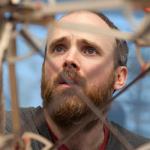
By Patrick Honner, MƒA Master Teacher
I know enough about Andrew Hacker to know what I was getting into by attending the event Course Corrections: Is High School Math Serving Society? Still, I was curious. I love math, and see it in everything I do, but I know not everyone feels this way. So it doesn't bother me when people suggest that schools should teach less mathematics, or different mathematics. There are many legitimate and compelling questions to be asked about how we approach math education, and as a teacher I enjoy thinking and talking about those questions.
The event, hosted by the National Museum of Mathematics, offered a spirited conversation between Andrew Hacker, the political science professor turned math critic, and the highly regarded mathematician and teacher, James Tanton. Hacker advanced his standard arguments against compulsory mathematics education: math is too hard; it prevents too many students from graduating; it's not really necessary for jobs. Tanton spoke passionately about the importance of bringing real mathematical understanding to our students and the value of mathematics beyond the classroom. And MƒA President John Ewing framed the conversation well as moderator, placing it in the context of our country’s century-long debate about math education.
A Q&A session followed the moderated discussion. Being familiar with Andrew Hacker's work, I came prepared with some questions for him:
- "You advocate teaching statistics instead of algebra. How can someone understand averages, variation, distribution, and inference without understanding basic algebra?"
- “Most people rarely use knowledge of history, literature, poetry, music, or foreign language in their jobs. Should we stop teaching those subjects as well?”
- "You claim that at most five percent of people use algebra or geometry in their job. You made this number up, right?"
But I didn’t ask the question that concerns me the most, because that question isn’t for him. It’s for everyone else: “Why are we listening to Andrew Hacker?”
Andrew Hacker isn’t an expert on mathematics. And he isn’t an expert on math teaching, either. He has every right to voice his complaints, some of which are worthy of consideration, but why has he been given such an enormous platform – high profile Op-Eds, interviews, lectures, a book deal – to address the public about how to “fix” math education?
The fact that Andrew Hacker has such an outsized and undeserved role in steering this conversation is itself one of our problems: we aren't listening to the right people. If we are really interested in identifying and addressing the problems facing math education today, we should be listening to math teachers.
I have spent over 10,000 hours working with students in mathematics classrooms, which, based on what I know about his teaching experience, is about 9,800 more hours than Andrew Hacker. And I’ve easily spent twice that amount of time outside the classroom thinking about mathematics, teaching, and learning. Now, I may not have the easy answers and snarky soundbites that get you an Op-Ed or a book deal, but I have real expertise in what matters most in this conversation.
And I’m not alone. Math for America’s teachers constantly coalesce around matters of mathematics, curriculum, pedagogy, technology, and student engagement. We have the knowledge, experience, and insight to lead on these issues and contribute constructively to this dialogue. Together with the many other outstanding teachers all around the country, we know firsthand what the issues in math education are: we face them, and address them, in and out of our classrooms every day.
It's all too common for students to leave school harboring negative feelings towards mathematics. While it can be comforting to commiserate with someone like Andrew Hacker, understanding and addressing the real, substantial, and complex issues facing math education today depends on hearing from those who understand them best.
If we want productive dialogue about how to move mathematics education forward, we need to listen to the right people. Let’s start by listening to teachers.
